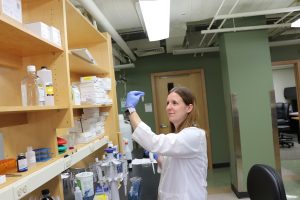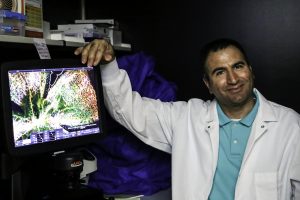Colleen McDowell, PhD, and Ismail Zaitoun, PhD, have been announced as the recipients of the 2019 Lions Eye Bank of Wisconsin (LEBW) Gift of Sight Discovery Awards. This internal competition is open to UW Department of Ophthalmology and Visual Sciences (DOVS) faculty and scientists.
In 2015, LEBW partnered with DOVS to promote innovative research to better understand and treat blinding diseases. LEBW has now funded a total of ten projects at $50,000 each. The 2019 projects are summarized below.
Colleen McDowell, PhD, assistant professor
One of the major risk factors for the development of glaucoma is an increased pressure inside the eye. An increase of pressure occurs in the eye when fluid is not drained properly through the drainage structures in the front of the eye. Our project aims to understand what regulates the arrangement and construction of the drainage structures and how changes in this makeup prevent proper drainage in the eye. Understanding the molecular mechanisms that effect glaucomatous damage is essential to the identification of therapeutic targets that will help prevent disease progression. The proposed project will help elucidate the role of a novel pathway contributing to the regulation of the pressure within the eye and the development of glaucomatous damage. These data can then be used to develop further studies that can be tested in human clinical trials. The ultimate goal is to develop disease modifying therapeutics that will stop and/or prevent the development of glaucoma in human patients.

Ismail Zaitoun, PhD, associate scientist
Macular scar formation is an unfavorable outcome of the abnormal growth of new blood vessels in the wet form (neovascular form) of age-related macular degeneration (nAMD), a major cause of blindness in elderly. Unfortunately, there are limited therapy available for prevention of scar formation, and many patients with nAMD do not respond to the current therapy. We know very little about how these scars forms. We have recently become interested in this clinical problem and started collecting some encouraging results regarding the underlying mechanisms. We are very grateful for the funding of the Lions Eye Bank of Wisconsin. This will allow us to establish critical tools that are essential for exploring the underlying cellular and molecular mechanisms responsible for scar formation in nAMD. We propose a protein called GLI1 is responsible for driving scar formation and its negation will have therapeutic benefit for nAMD patients.

Past recipients include:
2018:
Yao Liu, MD
Stuart Thompson, PhD
2017:
Paul Kaufman, MD
Kim Stepien, MD; Mihai Mititelu, MD, MPH; Melanie Schmitt, MD
2016:
Neal Barney, MD
Curtis Brandt, PhD
2015
Gillian McLellan, PhD, BVMS
Robert Nickells, PhD